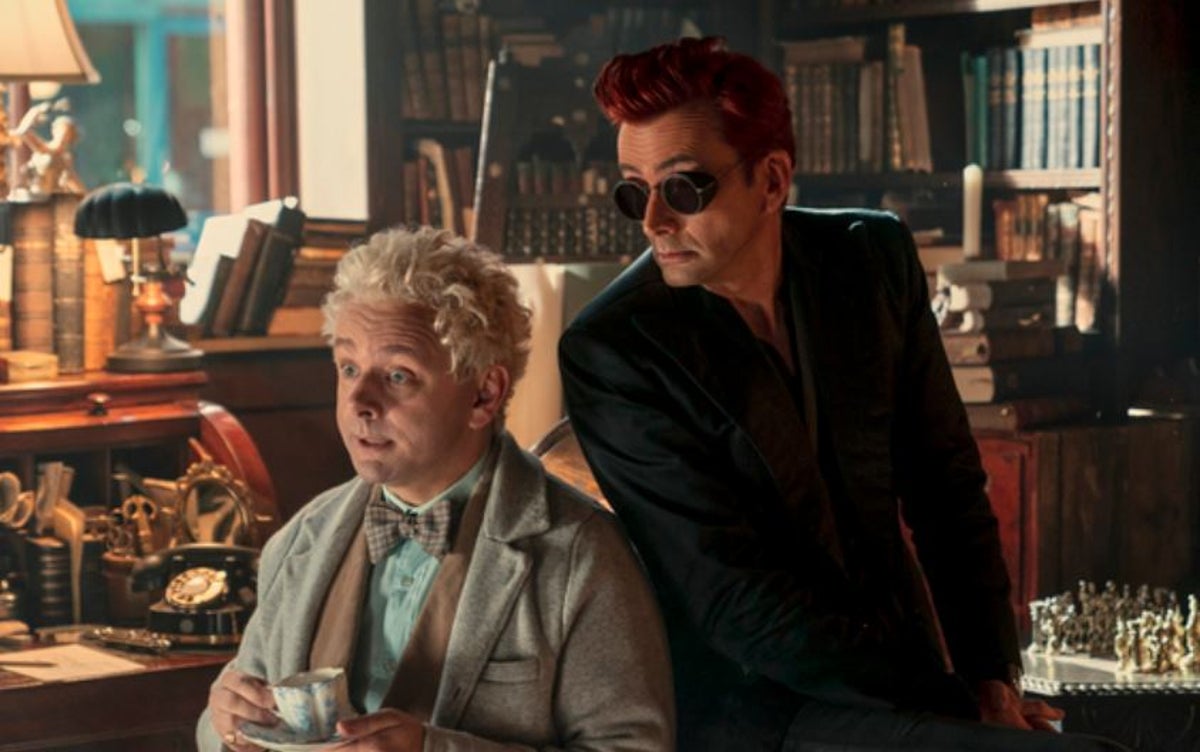
How do you top the end of the world? That’s the task for Good Omens season two (Amazon Prime Video), which picks up where the Neil Gaiman and Terry Pratchett novel left off: with Armageddon averted and a fragile truce established between Heaven and Hell. But, as dramatic stakes go, slaying the Four Horsemen with a flaming sword doesn’t leave you much wiggle room to crank up the pitch, and so, instead, Good Omens goes back to what it does best. A biblical buddy comedy of epic proportions.
With his bookshop restored, fussy angel Aziraphale (Michael Sheen) is enjoying a quiet life on earth, with the companionship of rogue demon Crowley (David Tennant). That all changes when chief angel Gabriel (Jon Hamm) shows up at the shop, stark naked, seemingly with no idea who he is. “His royal smugness”, as Crowley brands him, is reduced to a simple naïf, rechristened “Jim”. But while Aziraphale and Crowley try to unravel the mystery of how, and why, the Archangel has shown up, nude and amnesiac, the forces of Heaven and Hell are on his trail too. And so, in place of the world’s end, we have a galactic farce. Dude, Where’s My Archangel?
Do you remember the second season of Big Little Lies? No, me neither. What about Game of Thrones’ sixth instalment onwards? Perhaps you wish you could forget that one. Once the adaptation of a novel exceeds its source material, it runs into tricky ground. Some, like The Handmaid’s Tale, can survive the transition, but most are scuppered on the craggy rocks of plot. Good Omens, a slim and tonally precise novel, seems like exactly the sort of project that would fall foul of this creative quagmire – and yet Gaiman and his late co-author had always envisaged it as the start of a saga. In the place of Pratchett, who died in 2015, Gaiman and broadcaster Amazon Prime have drafted in radio comedy legend (a heavy tag, given he’s still just 45) John Finnemore to ballast the writing duties.
In deviating from the novel and bringing a new voice to proceedings, there would, naturally, be a fear that something of the eccentric originality of Good Omens would be diluted. But Gaiman and Finnemore know precisely what made both the book and its television adaptation a hit: the chemistry between Sheen’s Aziraphale and Tennant’s Crowley. “Surely, the great thing about being a Demon is that you can do whatever you want,” Aziraphale moans to his reckless companion. “You sound jealous, angel,” Crowley deadpans back. Where the narrative of Good Omens’ first outing kept them apart at times, here the space is reduced. They are – by their own admission – best friends, not to mention collaborators in the great Gabriel cover-up.
The increased centrality of Aziraphale and Crowley squeezes out the necessity for the supporting cast (who caused an occasional loss of momentum, previously). There are no direct replacements for the B-plot leaders, like Jack Whitehall’s Newton Pulsifer or Adria Arjona as Anathema Device. Instead, the third hand belongs to Jon Hamm, given increased prominence as Gabriel/Jim. Hamm relishes the physical comedy of his fish-out-of-water act, grinning maniacally and dressing like someone from Wallace and Gromit. “Did they va-voom?” he giggles, childishly, at a rain-soaked meet-cute across the street. His presence in the bookshop also opens the door to meta gags: fanning himself with a Terry Pratchett paperback, for example, or, when alphabetising the entire inventory by first line, reading from a copy of Good Omens itself.
In truth, your tolerance for the Douglas Adams-inflected humour – very British – will define how you feel about Good Omens’ second chapter, just as it will have dictated your impressions of the first. The absence of that core idea – the Antichrist accidentally raised in an English village – undoubtedly lowers the ticking-clock stakes and creates a story less easily pitched in an elevator. But Gaiman and Finnemore have created a fantastical journey, even if it lacks an existential endpoint. After all, Good Omens has never really been about simple solutions. “I don’t suppose he’s getting any answers,” Aziraphale whispers to Crowley, as they witness a mere human talking to God. “No,” Crowley responds, “but just to be able to ask the question…” Good Omens season two might be all questions and no answers, but, all the same, it’s a scriptural spectacular.







